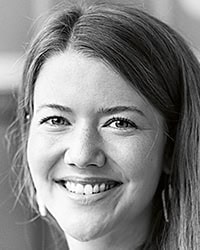A survey conducted by Lund’s PhD student association in December 2023 shows that 40 per cent of doctoral candidates believe they are depressed or suffering from either stress or anxiety. The survey was sent to all doctoral candidates in Lund, approximately 2,800 people. Almost 400 responded.
Laura Cox, the PhD student mentor at Lund University behind the study, is not surprised by the results.
“I think this is just the tip of the iceberg. I already suspected that many people would be too busy, or not feeling well enough, to fill in the questionnaire. That was also the kind of feedback I received afterwards,” she says.
Another study, from Gothenburg University, covers just over 20,000 people who were PhD students between 2006 and 2017. The researchers analysed data from the National Board of Health and Welfare’s register of pharmaceutical products and from Statistics Sweden. They found that PhD students’ use of anti-depressants, anti-anxiety medication and sleeping pills increases by 40 per cent in the five years following the start of their doctoral programmes.
The study compares PhD students’ prescribed pharmaceuticals consumption over time with people of the same age and gender but who only have a master’s degree.
“Before the doctoral programme starts, there are no differences,” says Sanna Bergvall, a senior lecturer in economics and one of the authors of the report. “But when they start their doctoral studies, we see a sharp increase in the first year, which then increases even more in the following five years. The peak is around the fifth year, when we see that the PhD students’ use of psychiatric medicine has increased by 40 per cent. And then we see that it falls again.”

Sanna Bergvall
Senior lecturer in economics and one of the authors of the report
PhD students who move to Sweden from other countries are not included in the study, as it is not possible to study their use of prescription medicines prior to their doctoral studies. Only doctoral candidates in research fields where the average working time is at least 70 per cent of a full-time position are included in the study.
“We want to capture people whose doctoral programme is their primary activity,” says Bergvall.
The fact that PhD students’ use of psychiatric medication is higher than that of other groups shows the extent of the problem of mental ill-health among PhD student, says Laura Cox in Lund.
However, increased use of medication among PhD students is not really something she has noticed so far, either during her own doctoral studies or later.
“As I said, we’re at a fairly early stage here, but it might be something for me to bear in mind in the future. At the same time, it’s tricky because there is some stigma around taking medication for mental ill-health. It’s possible that many people who might need medication don’t actually take it or don’t seek help in other ways,” she says.
When Universitetsläraren interviews Laura Cox, it is her first week as a mentor at Lund University. She will be working with PhD students’ mental well-being in a newly established position funded by Lund’s PhD student association for one year. She completed her doctorate in psychology in Lund in 2024 and is also Vice Chair of the PhD student committee of the Swedish National Union of Students, SFS-DK
Between the occupational health service, which is for employees in general, and the student health service, which is not really intended for PhD students, there is a gap that the new mentor role is designed to fill, she says.
“Although the student health service has some information that is useful for PhD students, there are a lot of problems that are specific to this group. We believe that these problems can be prevented at an earlier stage.”
Lund already has a PhD student ombudsman. There, doctoral students can receive support on matters regarding rights, obligations and conflicts with supervisors. Cox, however, will work preventively.
“We think that you need to have someone on your side at an early stage, to help with difficulties that arise and to work preventively.”
In the weeks following the interview, Cox will start up drop-in activities on a rotating schedule at the different faculties in the mornings. This basically involves her being in the cafeterias on campus. Without making an appointment, PhD students can come by, ask for advice or talk about their experiences.
“The idea is for me to get close to them where they actually work and have their problems, instead of the doctoral candidates having to come to a place they’ve never been before. That they don’t have to cross that barrier to seek help,” she says.
In the afternoons, people can book appointments for one-on-one discussions about more private or confidential matters, either in Cox’s office or in a digital meeting.
“My background is partly in clinical psychology and partly in coaching. Within those fields, I have learnt a lot of practical steps to help people work out what they need and how they can help themselves to feel better. I hope to make use of that.”
“PhD students’ mental wellbeing is probably impacted by a number of different factors in combination,” says Sanna Bergvall at Gothenburg University. “It’s a very lonely job. You often have sole responsibility for your thesis. There’s a lot of pressure, fairly little control and little information about what is expected of you.”
She believes it is important to recognise and be alert to warning signs. The fact that PhD students are often so dependent on a single supervisor can also be problematic.
“You are very closely connected to them and in a dependent position. It should be possible to change supervisors if things aren’t working, for instance,” she says.
Laura Cox would like to see a system for monitoring and developing the skills of supervisors.
40 per cent
…is the amount that the use of anti-depressants, anti-anxiety medication and sleeping pills by doctoral candidates increases by during the five years following the start of their doctoral programmes, according to a study from Gothenburg University of over 20,000 people who were doctoral candidates between 2006 and 2017. The study is based on data from the National Board of Health and Welfare’s register of pharmaceutical products and from Statistics Sweden.
Are you feeling unwell?
If you are experiencing mental health issues, contact a psychiatric emergency room or call 112. If you need help with where to seek care, call 1177. You can also contact the doctoral candidate ombudsman or the occupational health service at your university.

















